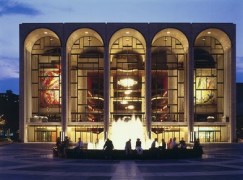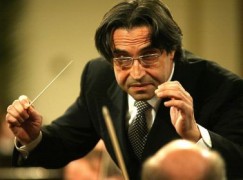Message from Alan Gordon, the Agma negotiator:
During AGMA negotiations yesterday with the Met, we reminded Peter Gelb that there were several single mothers in the chorus who had severely disabled children needing constant medical care and other choristers who had children needing special medications, all of whom would be endangered if their health insurance was cut off when he locks out the performers, and we proposed that even if he fulfills his lockout threat on 8/1 he should keep health insurance in effect until an eventually negotiated deal, so as not to intentionally and unnecessarily hurt his own people.
Gelb’s response was that he had to cut off their health insurance to give him ‘leverage’ in the negotiations.

The Rochester Philharmonic, which fired its Norwegian music director Arild Remmereit 18 months ago after a breakdown of relations with the management, has announced Ward Stare as its next conductor.
Stare, 31, grew up in Rochester, played in its youth orchestra and, at 18, became principal trombonist at the Lyric Opera of Chicago. In 2012 he made his conducting debut at the Lyric Opera of Chicago, having served four years as resident conductor of the Saint Louis Symphony. He starts in Rochester on 1 September.
Some local musicians, however, still unhappy at Remmereit’s dismissal, have challenged his credentials. They argue that Ward Stare appears hopelessly under-experienced to take the leadership of a distinguished mainstream orchestra.
Time, we guess, will tell. (It usually does.)

Musicians of the Metropolitan Opera orchestra have identified a further $1.2 million in savings, raising the total to $31m. They maintain the company is in trouble because of Peter Gelb’s admitted profligacy. They add: The Met needs to address the real problems of artistic and financial mismanagement.
Full statement below.

New York, NY–Tuesday, July 29, 2014–The MET Orchestra Musicians love the Metropolitan Opera and want it to succeed. For 30 years they have had excellent labor relations, and had hoped that respectful exchange would continue.
This past Friday, July 25, the musicians and Local 802 made a detailed presentation in support of the union’s comprehensive proposals to the Met, detailing savings of over $30 Million. On Saturday, July 26, the Met responded to that presentation and did not accept any of Local 802’s proposals. Local 802 prepared a further response to the Met’s comments on the presentation. As it was being offered, the Met representatives indicated that they were not considering the presentation and would only entertain acceptance of the Met’s proposals made on February 26th. Met management has not changed any of those proposals.
The following link contains an updated presentation responding to the Met’s rebuttals, and proposing a further cost savings, to bring the total savings to $32.2 Million.
CLICK TO READ THE REVISED MUSICIAN’S REPORT. This document (which was presented to management on 2014-07-25) will remain posted online indefinitely, and will be a “living document.” It will be constantly updated with any necessary emendations and corrections, which the musicians will fully acknowledge and document.
The Met Musicians report also address the following points:
- Met Musicians Support Innovation: We support new productions, but new productions premiered under Peter Gelb have been widely criticized by the press and have negatively affected box office returns. New productions under Peter Gelb are reviewed negatively over 60% of the time, while the MET Orchestra is reviewed positively over 80% of the time.
- New productions that premiered under Peter Gelb have been poorly received by critics and the public: There is a direct correlation between negative critical reception and box office returns for revivals that were premiered under Peter Gelb. Increased ticket prices and an increased number of these revivals negatively impacted revenue.
- Opera is not “Dying” as Mr. Gelb claims, but is in fact thriving at other opera houses: Other opera companies have recently shown success in ticket sales and fundraising. Their leaders believe in the future of the art form and value a commitment to artistic excellence.
- Reductions in compensation would devastate the MET Orchestra’s ability to attract and retain top talent. The MET Orchestra works 30% more than its peers for similar wages. A decline in compensation would make the MET Orchestra a far less attractive destination for the world’s best musicians.
- Peter Gelb has exploded the Met’s budget on productions that have not shown a good return on investment: Peter Gelb took a balanced budget and increased it by 50%. Three quarters of that increase came from Media, New Productions, and “Other.” The Met currently spends an average of over $1 million more on each new production, inflation-adjusted, than it did prior to Peter Gelb’s arrival.
- The Excellence of the MET Orchestra is one of the Met’s Strongest Assets:The MET Orchestra has achieved extraordinary critical acclaim and garnered numerous awards. Reducing the investment in the orchestra, and the resulting increase in turnover, would have devastating effects on the artistic quality of the Metropolitan Opera.
- The Met needs to address the real problems of artistic and financial Mismanagement: Cutting employee compensation does nothing to address the Met’s deeper problem of financial and artistic mismanagement.
The MET Orchestra Musicians’ Report is accompanied by a letter from Jessica Phillips Rieske, Acting Principal Clarinetist and Chair of the MET Orchestra Committee, explaining the timbre of negotiations and actions on the parts of Peter Gelb that have made it necessary to clarify facts and make their case in the public arena:
In the interest of full disclosure and transparency, the MET Orchestra Musicians wish to directly address the nature and format of these negotiations. We deeply regret that these contentious negotiations are taking place in such a public arena: for 34 years we have enjoyed labor peace, and all negotiations were conducted behind closed doors with a media blackout that all parties followed.
Peter Gelb made this negotiation different. Our Orchestra Committee received his initial proposals on Wednesday, February 26, 2014. On Thursday, February 27, 2014, the New York Times posted an article highlighting Mr. Gelb’s proposals. The article states that its sources for this information were “three people with knowledge of the proposal” who had requested anonymity. The union did not give this story to the New York Times. It was only when contacted for response that the union president stated “We’ve never received a set of proposals from the Met that represented such a devastating reduction in pay.” The “media blackout” was over before it could ever begin.
We now find ourselves in the position of having to make our case publicly, but we are nevertheless committed to doing it with the utmost accuracy and transparency….We hope that our data-driven approach to find solutions for the Metropolitan Opera will lead to an open opera house, a salvaged season, and a sustainable future for many decades.
###
###
First Zubin Mehta quit over budget cuts. Now the veteran Austrian artistic director of the Palau de les Arts de Valencia is on her way. The dream is over.

Samuel Elkind spent his life in the Symphony. When he retired, he kept coming back to rehearsals and concerts.
Sam has died, aged 95.

Musicians of the Metropolitan Opera orchestra are about to issue a further challenge to claims by the manager, Peter Gelb, that high labour costs have brought the Met to a point of economic crisis. The musicians argue that the crisis was caused by Gelb’s poor financial management.
They could hardly believe their eyes when Gelb admitted the charge in a rambling rebuttal to the musicians’ 84-page case for making $31 million savings without having to suffer wage cuts.
On this page, Gelb admits that he got his financial forecasts badly wrong.

If the print is too small for your eyes, here’s the nub of it:
Gelb put in place ‘a conscious and successful business strategy that emphasized growth in revenues.
‘Earned revenues grew through FY11 and contributions grew through FY12.
‘It is because that revenue growth has ceased that we are here today.’
In plain English: Gelb imagined the money would keep rolling in. It didn’t – in part, because people stayed away from his shows and, in part, because wealthy persons refused to support what they saw as a failing enterprise. The Met’s problems are rooted in Gelb’s overspend.
The cause of the crisis is, therefore, Peter Gelb. He needs to be locked out.
Malcolm Layfield, who was forced to resign last year as head of strings at Royal Northern College of Music during police investigations of historic sex offences, has finally been charged with one count of rape.
The charge relates to a woman of 18, allegedly assaulted in 1982 when Layfield was teaching at Chetham’s School of Music in Manchester. Layfield, 62, is due to appear at Manchester City Magistrates’ Court on 14 August 2014.

The liquidation of Rome Opera – music director: Riccardo Muti – has been called off. For a month, at least.
A peace deal has been put on the table for the unions to consider in a referendum. There will be cuts, but not as deep as feared. For the moment.
Report here.

Renato Fresia-Verdino, who coached singers at Opera Australia for 25 years, died suddenly on Sunday of a heart attack. He was 64.
Renato had also taught singers in New Zealand and Wales. A a kid in Rome, he played crowd scenes in Ben Hur.
Tribute here.

Giorgio Gaslini, the Italian jazz pianist who composed the soundtrack for Michelangelo Antonioni’s La notte (The Night, 1961), has died, aged 84.
He was the first teacher of jazz at Rome’s Santa Cecilia Academy.

I was asked the question yesterday by a Classic FM camera team at the opening of the Bristol Proms, an event that is trying to break the straitjacket formality of concertgoing.
The answer that sprang to mind was: ‘if classical music is dying, then you’re doing it wrong’.
If the audience wont’ come, choose another audience.
If the hall is morbid or forbidding, change the venue.
And don’t – whatever you do – call it classical music.
Every label you attach to music diminishes it. Genre is history. People in the 21st century talk of ‘my music’, not some marketing category.
The global interest in music has never been higher – this website is proof of that. Just get out there are bring makers of music together with those who crave it.
Here’s the impromptu interview.

We’ve had sight of a letter sent by an eminent American soprano to a number of her colleagues, asking them to join her in reducing their fees by 12.5 percent in order to help the Metropolitan Opera balance its books.
Hers is an honourable, heartfelt suggestion and one which takes an admirable degree of personal responsibility for the art of opera and one of its leading institutions.
The diva claims that several of her colleagues have already agreed to her suggestion and the tone of her letter indicates that she has bought into the Peter Gelb narrative without benefit of independent assessment.
Admirable as her sense of responsibility may be, it will be seen by colleagues in the orchestra as a rejection of their argument – that the Met’s problems are caused by Gelb’s economic inefficiencies – and a betrayal of their campaign for a just and sustainable pay deal.
We have withheld the diva’s name in order not to inflame an overheated situation. But we suspect the Met may publish it.














